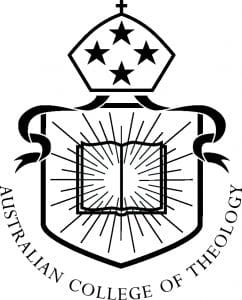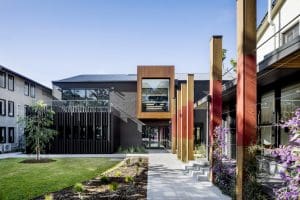Overseas Students
Ridley College is happy to consider applications from overseas students. Along with general admission procedures, there are certain requirements that must be met before overseas students are accepted for study. These include:
- Evidence of your financial support
- Two recommendations from your home country
- Proficiency in written and spoken English.
Ridley College is approved to deliver the following courses of the Australian College of Theology (CRICOS Provider 02650E):
- Bachelor courses – Bachelor of Ministry (CRICOS Code – 054670D), Bachelor of Theology (CRICOS Code – 054676J)
- Graduate courses – Graduate Certificate of Divinity (CRICOS Code – 076017G), Graduate Diploma of Divinity (CRICOS Code – 054685G), Master of Ministry (CRICOS Code – 088085G), Master of Divinity (CRICOS Code – 054688E)
- Higher Degree by Research courses – Master of Theology (CRICOS Code – 094613D), Doctor of Philosophy (CRICOS Code – 076015J)
Prospective international students, especially those from developing countries, should be aware that the cost of living in Melbourne is high. We do not offer scholarships for overseas students. It is important to be aware that those who come from a developing country and have trained in Melbourne often find it difficult to return home. Language issues are an added challenge, especially in exams and assignments.
Ridley College works in partnership with the Overseas Council of Australia and Langham Partnerships, sending our faculty for short-term teaching at theological colleges in developing countries.
Support
Government regulations require evidence of means of financial support. This must be provided before any overseas student is granted a Visa to enter Australia. This includes the capacity to cover all travel expenses, tuition fees, living expenses for both the individual and any dependents who accompany the student. The student and all accompanying dependents must hold Overseas Student Health Cover for the duration of their stay.
Ridley College also believes that overseas students should have some support from their home church. Where possible, the college seeks an assurance that a suitable post is available in the student’s home country after the completion of study.
Recommendation from the home country
Ridley College asks for references from two people who know the student well. One of these should be in a position to have observed and comment upon the student’s involvement in the life and ministry of the church.
English language proficiency
Proficiency in both spoken and written English is essential for undertaking theological studies, particularly at an advanced level. English language proficiency can be demonstrated in two ways.
1. By the completion of High School (VCE, HSC etc.) in English in one of the following countries:
- American Samoa
- Australia
- Botswana
- Canada
- Fiji
- Ghana
- Guyana
- Ireland
- Jamaica
- Kenya
- Lesotho
- Liberia
|
- New Zealand
- Nigeria
- Papua New Guinea
- Singapore
- Solomon Islands
- South Africa
- Tonga
- Trinidad and Tobago
- United Kingdom (including Northern Ireland)
- United States of America
- Zambia
- Zimbabwe
|
2. IELTS test (International English Language Testing System) – Academic version.
Overseas students may arrange to sit for the IELTS test in a major city of their own country. The test is administered by officers of the International Development Program of Australian Universities and Colleges (IDP) or the British Council. Please note that overseas students must sit the academic version of the test.
The results required are as follows:
- Bachelor degree: IELTS 6.5 overall with a minimum of 6.0 in each subtest (OR 10 years’ English in-country experience).
- Graduate Diploma or Master of Divinity: IELTS 7.0 overall with a minimum of 7.0 in reading and writing, and 6.5 in listening & speaking (OR 10 years’ English in-country experience).
- Higher Degree by Research: IELTS 7.5 overall with a minimum of 7.5 in reading and writing, 7.0 in listening and 6.5 in speaking.
The results of the test should be sent to Ridley College, or brought to an interview by students already residing in Australia.
Online learning
Per the ACT’s Course Progress Policy, overseas students are permitted to take up to 25% of their course online, but the overseas student must study at least one unit that is face-to-face in each study period. The only exception is if the overseas student is completing the last unit of their course and it is only available online.
Fees
Click For Current Fees
Interviews and Acceptance
Applicants must have their IELTS test results before arranging an interview. Applicants will be notified in writing of their acceptance for study at Ridley College after satisfactory completion of all admissions procedures. A Confirmation of Enrolment form will then be issued by Academic Services at the Australian College of Theology.
| Contact |
Phone Number |
| Deputy Principal, Academic | Rev Dr Mike Bird |
P: +61 3 9207 4800 |
| Registrar | Mrs Katrine Bramley |
P: +61 3 9207 4800 option #3 |
Student Admissions / Overseas Student Liaison Officer |
Ms Jessica Fields |
p: +61 3 9207 4800 option #2 |
Student Support Services:
Details regarding Ridley’s student support services can be found here. You may also want to read our Overseas Student Extension, Deferment, Suspension and Cancellation Policy.
There are additional helpful details for overseas students available on the Study Melbourne website.
Where to go for more information:
Further information about studying in Australia can be found at the Australian College of Theology’s website section for Overseas Students or at the Department of Immigration and Citizenship website at www.immi.homeaffairs.gov.au. You can read about your working rights on the Department of Immigration and Citizenship’s website, as well as on the Fair Work Ombudsman website.
The Education Services for Overseas Students (ESOS) legislation provides standards in for education delivery for student on a student visa studying in Australia. You can read more about this framework here.
You can also access our Overseas Students Release and Transfer Policy.
Australian College of Theology CRICOS codes for International Students








